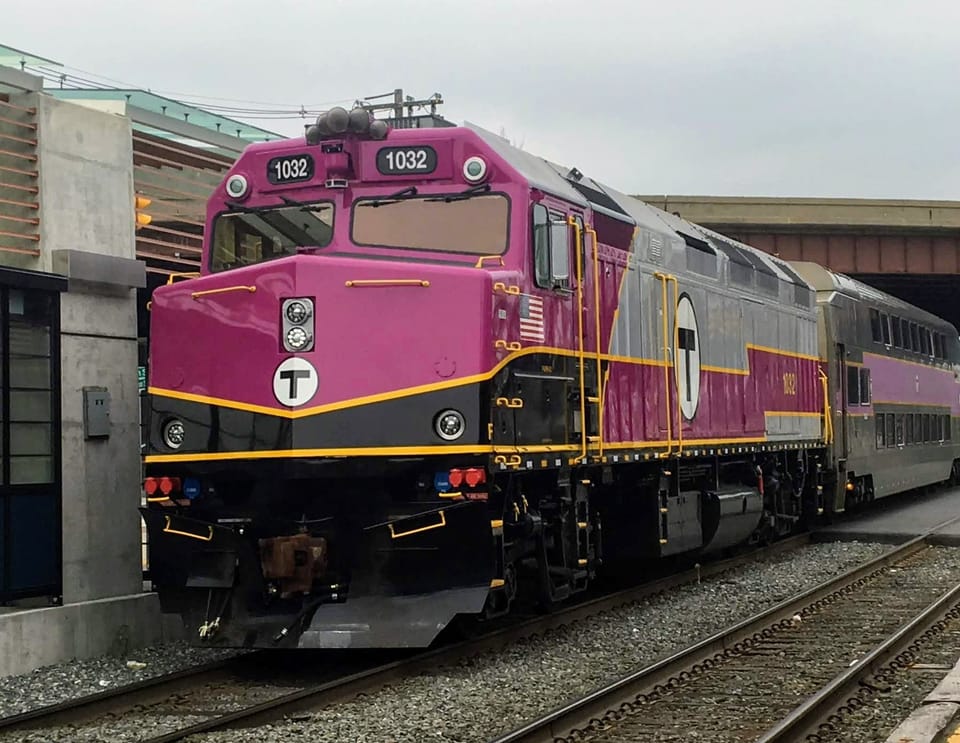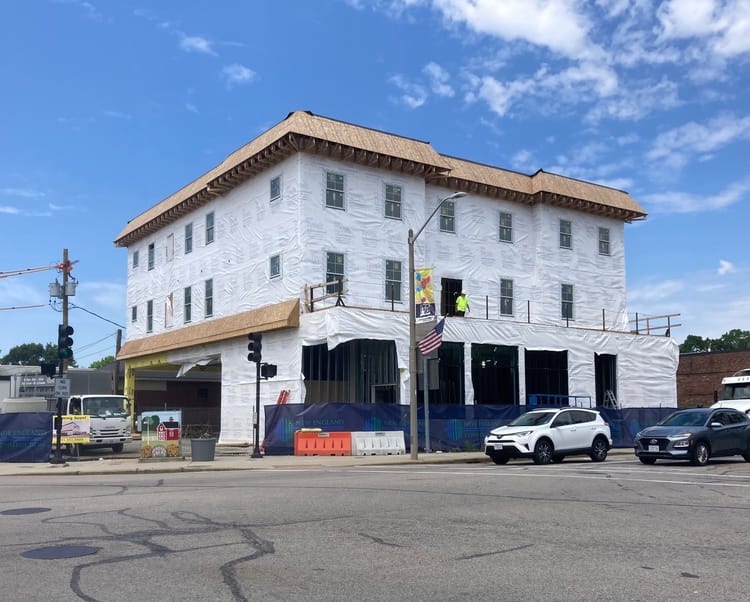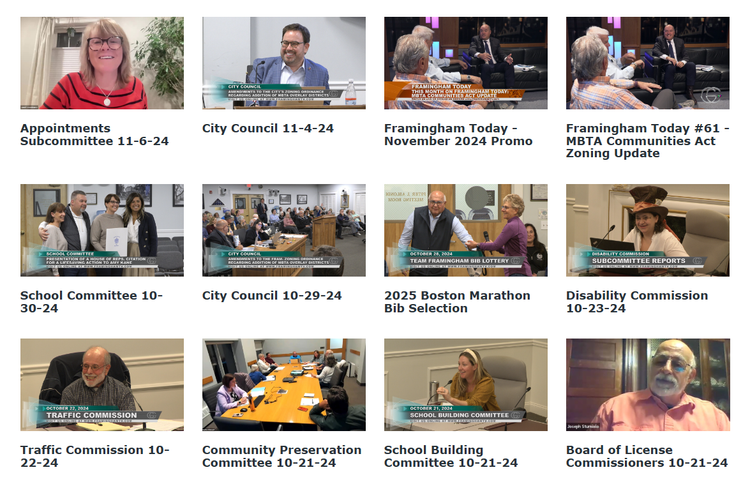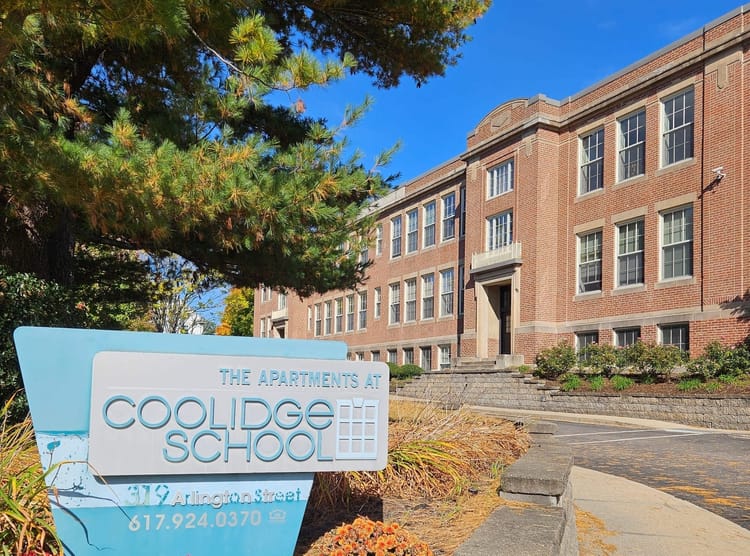Learning from First Movers in Rapid Transit Communities

Breaking news: Last night Norwood Town Meeting passed MBTA Communities zoning. Elizabeth Hestad, Town Meeting Member, reported to the Upzone Update that the district covers 78 acres, all in areas all near Norwood’s three commuter rail stops. The district includes some parcels that are likely to be redeveloped, including a parking lot, a chemical manufacturing plant, and an auto body shop. The vote was 103 to 48.
Greater Boston is home to a national expert on the political inequalities that shape housing policy—Professor Katie Einstein of Boston University. She co-wrote the landmark book, Neighborhood Defenders. And she has her eyes on MBTA Communities rezoning efforts. This week, she has guest-authored the Upzone Update cover story.
Also, don't forget to check out the MBTA Communities Tracker. Previous newsletters and a map of all MBTA Communities can be found there.
By Katherine Einstein
Like so many residents of Greater Boston, my Boston University students feel squeezed by the region’s exorbitant housing costs. The initial rollout of the MBTA Communities law in 2023 presented an exciting opportunity to show my students what the state was trying to do to address this crisis—and what obstacles may limit the efficacy of housing reform.
As part of Boston University’s Initiative on Cities MetroBridge Program, students in my Fall 2023 course, Inequality in American Politics, partnered with the Metropolitan Area Planning Council (MAPC) to analyze the initial rollout of MBTA-C plans in four rapid transit communities: Arlington, Brookline, Milton, and Newton. Students attended public hearings and town meetings; interviewed local officials and advocates on both sides of the debate; reviewed previous meetings and plans; and observed local online forums. The full results of their research can be found in Political Lessons Learned from the Initial MBTA Communities Act Rollout.
The report highlights four key insights from the first year of implementation:
1. Tailor your organizing for the institutional structure of your community–including election timing.
2. The loudest voices do not always represent the broader community.
3. Don’t let perfect be the enemy of the good.
4. Much of the important organizing happens well in advance of the final vote.
In this Upzone Update post, I will outline the first two.
I. Tailor your organizing for the institutional structure of your community–including election timing.
Massachusetts cities and towns feature different governance structures. Some of the communities that fall under MBTA-C’s purview are cities. Others are towns governed by a Town Meeting structure. In addition, Massachusetts local elections are all held off-cycle. This means that they do not coincide with presidential elections. Research shows that off-cycle elections may prove especially challenging for organizers, as they tend to be low-turnout affairs dominated by older, whiter, home-owning voters who disproportionately oppose the construction of new housing.
Milton and Newton illustrate how both institutional structure and election timing shaped the MBTA-C process. In Milton, organizers recognized the importance of directly communicating with Town Meeting Members (TMMs). Affordable Inclusive Milton, a local pro-housing organization, encouraged its members to speak at public forums about zoning, and to directly reach out to neighbors and peers who serve as TMMs to encourage them to vote yes on the MBTA-C plan. Despite vocal opposition to the MBTA-C plan, Milton’s MBTA-C plan passed at Town Meeting in December 2023 with a strong majority 158-76.
However, state law offers Milton residents (and those of other communities) the ability to call for a referendum to overturn certain types of Town Meeting votes on policies like MBTA-C. Milton opponents of MBTA-C availed themselves of this opportunity, leading to an election on February 14, 2024, where the town’s MBTA-C plan was overturned by a margin of eight percentage points (54 percent “no” vs. 46 percent “yes”).
The margin of victory for “no” voters stemmed largely from the East Milton neighborhood, where much of the upzoning in the town’s MBTA-C plan was planned; a whopping 82 percent of the neighborhood’s voters voted “no.” While turnout in Milton was certainly high by the (very low) standards of off-cycle elections, it was significantly lower than presidential year turnout. 5,842 Milton residents went to the polls to vote on the MBTA-C plan in 2024—less than one-third the 17,784 community members who voted in the November 2020 presidential election.
In Newton, MBTA-C negotiations occurred concurrently with a City Council election. Pro-housing organizers were quite active at local public meetings about the rezoning efforts. But, they were unable to electorally mobilize sufficiently to successfully (re)elect their slate of pro-housing candidates. Five new city councilors were elected after being endorsed by the city’s anti-development groups. As with Milton’s referendum on MBTA-C, turnout in Newton in November 2023 was considerably lower than the November 2020 presidential election (16,655 voters in 2023 vs. 50,570 voters in 2020). While Newton’s City Council ultimately passed its MBTA-C plan, it was considerably scaled back from original proposals.
II. The loudest voices do not always represent the broader community.
Arlington held at least 25 public meetings across multiple governing bodies to inform and engage the community about the town’s MBTA-C plan. Data from Arlington suggests that public officials should be cautious about generalizing broader sentiment from comments made in public forums. While 84 percent of Town Meeting members voted in support of the MBTA-C plan, only 40 percent of comments at Fall 2023 Arlington Redevelopment Board meetings were supportive, a gap of over 40 percentage points (see Table 1). Moreover, because the Town Moderator prioritized hearing from both sides of the MBTA-C debate, public commenters at the Special Town Meeting were evenly divided between supporters and opponents; public comment differed by over 30 percentage points from the final vote total. Someone simply listening to public comment might mistakenly believe that opposition was significantly greater than in actuality.
The next stage of the MBTA-C rollout poses a formidable challenge for housing advocates. They now must organize across dozens of communities, many of which are governed by open town meetings. We hope that the lessons learned from the implementation of MBTA-C in rapid transit communities can help to support the policy’s implementation on a broader scale.
Articles
WBUR reports that Governor Maura Healey is prioritizing her housing agenda: “We need more housing. We need to drive down costs," the Governor is quoted. “We are looking for everybody to realize that if we don't meet this moment and work together ... we're going to see people leave the state, and we're going to suffer for that."
Jonathan Berk of re:Main addresses the same concern as Governor Healey in his opinion piece for Banker and Tradesman: “To position Massachusetts for a stable housing future, we have to be willing to think bigger and be bolder in our policies.”
Why would we need to think bigger and bolder when MBTA Communities is an innovative approach to support local zoning for multi-family housing? Scott Van Voorhis suggests in his newsletter Contrarian Boston that some suburbs are moving to technically comply with the law while making it difficult to actually build enough needed housing. Scott links to the recent piece in CommonWealth Beacon by Luc Schuster who explains that MBTA Communities was designed as a smart incremental (moderate) step to address the housing shortage, and not as the whole solution to the state’s housing shortage.
What would bolder solutions be? Christopher Cunio and Aidan Gross argue in the Boston Business Journal that the legislature should amend the MBTA Communities zoning law to create a “private enforcement mechanism,” giving individuals the right to sue municipalities that fail to comply with the act. The advocacy organization Abundant Housing also has a full agenda of big and bold ideas. More ideas are sure to come in the months ahead. We will share them here!
Some of these ideas will have legs, not just because the state needs more housing, and housing is a most fundamental human need—but because zoning policy can garner left-right coalitions. Michael Jonas of CommonWealth Beacon explains, “While local opponents to the law often frame the showdown as a battle against big-government overreach—language that seems to draw from don’t-tread-on-me conservative thinking—what if they have the whole issue upside down? That’s the view of classic free-market advocates, who see the government overreach coming not from the new state law but at the local level, where a tangle of regulatory tripwires limits what people can do with their property.” The market-oriented think tank Pioneer Institute called for liberalized ADU zoning in 2018; and general zoning reform more than a decade before that.
Steve Adams writes in Banker & Tradesman that Watertown and Needham are going beyond paper compliance.
Watertown Square’s infrastructure and zoning are both getting upgrades. This article explains the plans and options; high resolution maps and photos can be reviewed in this presentation; and more information is available on the city’s website. Watertown’s effort is led by a team of consultants including Jeff Speck, author of the landmark urbanist book Walkable City, and Tim Love, principal of Utile.
This Week in Plymouth (video) features Plymouth Town Manager Derek Brindisi, Planning & Development Director Lee Hartmann, and Planner Judi Barrett discussing MBTA Communities. This will be taken up at Plymouth’s April Town Meeting.
Framingham City Council held a discussion with Mayor Charlie Sisitsky and Director of Planning and Community Development Sarkis Sarkisian on the topic. Wakefield Town Council referred a citizen petition related to the MBTA Communities to the Planning Board for a public hearing.
At Lexington’s recent local election, an incumbent Select Board member and two Planning Board members—all of whom were instrumental in passing MBTA Communities zoning last year—were reelected. The two challengers for the planning board positions both explicitly opposed implementation of MBTA Communities—and lost.
Judy Tymon, coordinator of the Greater Newburyport Housing Choice Coalition, writes in The Daily News that two Newburyport developments, the Foundry at 126 Merrimac Street and River’s Edge Condominiums at 129 Merrimac Street, are 15 units per acre, and the new developments by the train station are approximately 38 units per acre. She supports implementation of MBTA Communities zoning.
Jennifer and John McClain of Bedford wrote a Letter to the Editor of the Bedford Citizen: “We live in the center of Bedford, and we want more neighbors.”
This piece in Milford Daily News describes plans in Ashland, Wellesley, and Framingham, and includes a quote from Katie Einstein, the author of this week’s Upzone Update cover analysis.
The Boston Globe reports members of West Newbury’s planning board have been discussing two potential areas for rezoning: the former Knapp’s Greenhouses on Route 113 and the Dunn property on Main Street. The zoning will be on the agenda of Spring Town Meeting, on April 29.
There has also been news on the Milton case. Bruce Mohl at CommonWealth Beacon reported that local officials in Milton were divided about next steps, after Attorney General Andrea Campbell filed suit against the town claiming it was out of compliance with the MBTA Communities zoning law. She also filed a motion to have the case moved directly to the Supreme Judicial Court. The Boston Globe’s Andrew Brinker explained that Campbell wanted to accelerate the case, and have the case heard by the SJC, so that municipalities can gain clarity on the law’s requirements well before their deadlines for compliance. Brinker reported that the town’s attorneys, in their initial filings, said they plan to question whether the law’s implementation guidelines are mandatory. They might also look at constitutional issues related to state and local zoning powers.
The Globe then reported that Campbell’s lawsuit will be heard before the Supreme Judicial Court this year. Justice Serge Georges Jr., in his ruling, wrote, “I believe that this case raises novel questions of law which are of public importance, and which are time sensitive and likely to recur.” Oral arguments are scheduled for October. Georges said in his ruling that “the scope of a municipality’s legal obligations under [MBTA Communities] and under the related Guidelines, and whether the Attorney General has authority and standing to enforce compliance with the same,” are questions the court will consider. CommonWealth Beacon reported on the same developments.
The Globe also ran an editorial, “Wanted: a clear ruling from the SJC on new housing law,” outlining the key questions that SJC will consider. “Hopefully, the court will side with Campbell….”
Events, Hearings, & Votes
Walpole MBTA Communities Zoning Public Forum on March 27, 7:00 – 8:30 pm at the Council on Aging, 60 South Street. Includes presentation and discussion. More information on the Walpole website.
Watertown Square Area Plan Public Forum on April 4, 6:30 pm at 66 Galen Street, Watertown. The consultants are expected to present a single combination streetscape/zoning plan that will be the focal point for discussion throughout the rest of the planning process. RSVP here.
Gloucester info session on MBTA Communities on March 25, 5:30 – 7:30 pm at Gloucester City Hall. Questions can be sent to MBTAFeedback@gloucester-ma.gov.
A presentation about Medway’s MBTA Communities zoning on Medway’s website.
Merrimack Valley Planning Commission made this presentation for Boxford.
Information on Wilmington’s drop-in sessions can be found on Wilmington’s website.
Westwood’s May Town Meeting will consider whether to expand their MUMFROD zoning to meet MBTA Communities zoning standards.
West Newbury will discuss MBTA Communities zoning at spring town meeting on April 29.
MBTA Communities zoning will be taken up at Bedford’s Town Meeting, March 25, at 6:30 pm, in the Bedford High School Auditorium. The session might continue to Tuesday, March 26. The livestream for the first night of Town Meeting will be available on Youtube at this link.
Free webinar: Lessons Learned From EOHLC and AGO Preliminary Review of Proposed MBTA Communities Zoning on April 3, 12:00 – 1:30 pm. Details & registration on this Zoom link. Presenters:
Public event: Fostering Effective Public Engagement on Zoom, April 1, 9:45 am – 12:45 pm. Register here. (The virtual event is free.) In person, April 10, 9:00 am – 1:00 pm, at 100 High Street, Boston. In-person price is $50 with breakfast and lunch included. Register for the in-person session.
MHP has partnered with Citizens Housing and Planning Association (CHAPA) and the Consensus Building Institute (CBI) to develop an interactive training. The training will start by framing why it is important to create safe and effective public meeting spaces, followed by an overview of four main topics:
1. Understanding legal requirements pertaining to public meetings.
2. Engaging in effective outreach and creating meeting ground rules.
3. Structuring public meetings for success.
4. Learning how to keep a meeting from going off-topic.
The audience for the training includes municipal staff and board members, as well as local housing advocates. Trainers include staff from the Attorney General’s office, MAPC, and CBI.





